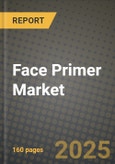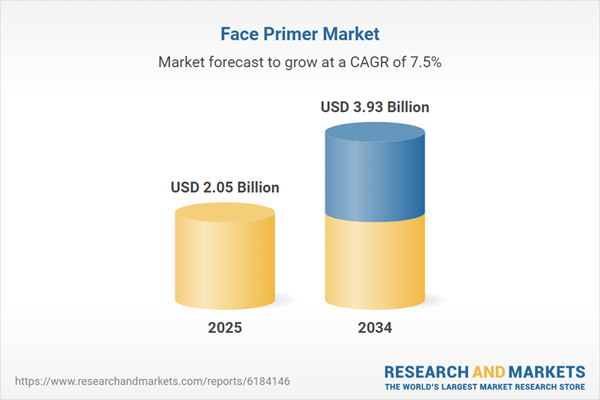Face Primer Market
The Face Primer Market is evolving from a makeup-prep niche into a performance base that bridges skincare and color cosmetics across price tiers and channels. Adoption is fueled by hybrid work, selfie culture, and demand for long-wear, pore-blurring, and shine-control benefits that survive heat, humidity, and masks while remaining gentle on skin. Core use cases span oil-control mattifiers, hydrating and barrier-supportive bases, glow-boosting illuminators, redness-neutralizing correctors, and gripping primers that lock makeup for event and all-day wear. Ingredient stories shift toward silicone-skin hybrids, film formers, polysaccharides, mineral blurs, peptides, niacinamide, and ceramides, balanced with non-comedogenic claims and breathable textures. Textures diversify - from gels and featherweight serums to putty balms and sticks - optimized for skin types and climates, with inclusive shade-correcting ranges and universal transparents. Brands win on finish fidelity (matte, soft-focus, luminous), clean feel, and compatibility with sunscreens and foundations, minimizing pilling and flashback under cameras. Packaging innovation emphasizes airless pumps, travel-friendly tubes, and recyclable components, while sampling and minis drive trial. Retail is omnichannel: specialty beauty, pharmacies, DTC, live/social commerce, and pro channels; education pivots to skin-prep routines, mixing with SPF, and region-specific sweat and sebum challenges. Competition intensifies as skincare-led players, celebrity brands, and legacy cosmetics expand primers tied to specific concerns, wear environments, and skin tones. Overall, primers transition into a daily step that smooths texture, controls shine, boosts hydration, and enhances foundation performance, enabling consumers to customize finish with fewer layers and enabling retailers to create clear, benefit-led shelves that improve conversion and loyalty across seasons and geographies.Face Primer Market Key Insights
- Hybrid skincare-makeup positioning. Primers increasingly deliver barrier support, oil control, hydration, and tone correction alongside makeup grip. This reduces layering complexity while reinforcing daily usage and repeat purchase.
- Finish fidelity as a KPI. Consistent matte, soft-focus, or luminous outcomes under varied humidity and lighting conditions is a core differentiator. Compatibility with SPF and foundation reduces pilling and flashback.
- Texture innovation broadens fit. Gel-serums, putty balms, sticks, and water-creams tailor sensorial feel by skin type. Breathable, non-comedogenic formats expand usage among acne-prone and sensitive consumers.
- Active-forward formulas. Niacinamide, peptides, ceramides, and antioxidants migrate into primers, enabling smoother pores and improved makeup wear over time. Claims shift from cosmetic to care-plus-performance.
- Shade-smart correction. Green, peach, and lavender correctors address redness and sallowness without heavy foundation. Universal transparent variants simplify shade matching and speed routine steps.
- Camera-ready reliability. Soft-focus powders, silica blends, and film formers manage texture under high-resolution cameras. Long-wear grip supports events, hybrid workdays, and travel.
- Clean and gentle narratives. Fragrance-light, allergy-aware, and silicone-balanced stories appeal to sensitive users. Microbiome-friendly and non-acnegenic claims bolster trust.
- Packaging and portability. Airless pumps, precise nozzles, and mini sizes improve hygiene, dosage control, and trial. Recyclable components align with retailer sustainability scorecards.
- Education drives conversion. How-to content on pairing with SPF, mixing with foundation, and zone-priming reduces returns and shade confusion. Pro tips translate to basket-building across categories.
- Channel-led differentiation. DTC exclusives, pharmacy derm-led lines, and makeup-artist collaborations create tiered assortments. Social commerce and live demos compress discovery and purchase.
Face Primer Market Reginal Analysis
North America
Demand is anchored by hybrid work, event wear, and athleisure beauty, with emphasis on oil control, true-soft-matte finishes, and SPF compatibility. Retailers segment shelves by skin concern and finish, promoting minis for trial and travel. Sensitive-skin positioning, non-comedogenic testing, and fragrance moderation drive pharmacy and specialty uptake. Content creators influence adoption of gripping primers for long-wear looks, while pro channels validate performance in varied lighting. Packaging trends favor airless components and easy-squeeze tubes that preserve texture integrity.Europe
Consumers favor understated, skin-like finishes with rigorous safety and ingredient transparency. Hydrating, barrier-supportive primers pair with mineral SPF and light bases for day wear. Retailers emphasize eco-claims, recyclability, and low-fragrance profiles; pharmacy-led education clarifies actives such as niacinamide and ceramides. Cooler climates sustain interest in nourishing textures and winter-proof wear, while urban markets prioritize shine control and pollution-resilience claims. Artisanal and derm brands compete through clinical substantiation and shade-correcting solutions for redness.Asia-Pacific
Humidity, heat, and sebum management shape demand for breathable mattifiers and water-gel textures. Korea and Japan drive thin-film, skin-care-first primers with soft radiance; Australia leans into SPF layering and sweat-resistance. In Southeast Asia and India, pore-blur and anti-slip grip enable lightweight base routines suited to daily commuting and events. Mobile-first shopping and live streams accelerate discovery, with cushion-friendly primers tailored to regional formats. Shade-correcting and tone-evening options address diverse undertones and hyperpigmentation concerns.Middle East & Africa
High temperatures and long wear windows push transfer-resistant, oil-control, and flashback-free solutions. Hydrating yet non-greasy primers serve dry-to-combination skin, balancing indoor AC and outdoor heat. Prestige retail hubs spotlight camera-ready finishes and event-proof grip, while pharmacies expand derm-backed, fragrance-moderated lines. Import-led assortments rely on strong distributor education and color-correcting ranges for olive and deeper undertones. Travel and tourism corridors amplify minis and value sets.South & Central America
Beauty culture favors glow-forward looks with humidity-ready durability. Primers focus on smoothing texture, reducing shine in T-zones, and ensuring adherence for high-energy environments. Retailers mix marketplace reach with specialty beauty, highlighting minis and bundles for trial. Local storytelling taps botanicals and lightweight gels, while international brands lead in camera-friendly soft-focus results. Education on SPF pairing, sweat resistance, and shade correction supports everyday wear from office to evening.Face Primer Market Segmentation
By Type
- Anti-Aging Primers
- Blurring Primers
- Color-Correcting Primers
- Hydrating Primers
- Illuminating Primers
- Pore-Reducing Primers
By Ingredient
- Zinc oxide & titanium dioxide
- Thermus thermophilus ferment
- Tocopheryl phosphate
- Others
By Chemistry
- Water-based
- Silicon-based
Key Market players
L’Oréal, Estée Lauder Companies, LVMH, Shiseido Company Limited, Coty Inc., e.l.f. Beauty, Revlon Inc., Unilever, Amorepacific Corporation, Kao Corporation, Mary Kay Inc., Oriflame Holding, Avon (Natura &Co), Clarins Group, KOSÉ CorporationFace Primer Market Analytics
The report employs rigorous tools, including Porter’s Five Forces, value chain mapping, and scenario-based modelling, to assess supply-demand dynamics. Cross-sector influences from parent, derived, and substitute markets are evaluated to identify risks and opportunities. Trade and pricing analytics provide an up-to-date view of international flows, including leading exporters, importers, and regional price trends.Macroeconomic indicators, policy frameworks such as carbon pricing and energy security strategies, and evolving consumer behaviour are considered in forecasting scenarios. Recent deal flows, partnerships, and technology innovations are incorporated to assess their impact on future market performance.
Face Primer Market Competitive Intelligence
The competitive landscape is mapped through proprietary frameworks, profiling leading companies with details on business models, product portfolios, financial performance, and strategic initiatives. Key developments such as mergers & acquisitions, technology collaborations, investment inflows, and regional expansions are analyzed for their competitive impact. The report also identifies emerging players and innovative startups contributing to market disruption.Regional insights highlight the most promising investment destinations, regulatory landscapes, and evolving partnerships across energy and industrial corridors.
Countries Covered
- North America - Face Primer market data and outlook to 2034
- United States
- Canada
- Mexico
- Europe - Face Primer market data and outlook to 2034
- Germany
- United Kingdom
- France
- Italy
- Spain
- BeNeLux
- Russia
- Sweden
- Asia-Pacific - Face Primer market data and outlook to 2034
- China
- Japan
- India
- South Korea
- Australia
- Indonesia
- Malaysia
- Vietnam
- Middle East and Africa - Face Primer market data and outlook to 2034
- Saudi Arabia
- South Africa
- Iran
- UAE
- Egypt
- South and Central America - Face Primer market data and outlook to 2034
- Brazil
- Argentina
- Chile
- Peru
Research Methodology
This study combines primary inputs from industry experts across the Face Primer value chain with secondary data from associations, government publications, trade databases, and company disclosures. Proprietary modeling techniques, including data triangulation, statistical correlation, and scenario planning, are applied to deliver reliable market sizing and forecasting.Key Questions Addressed
- What is the current and forecast market size of the Face Primer industry at global, regional, and country levels?
- Which types, applications, and technologies present the highest growth potential?
- How are supply chains adapting to geopolitical and economic shocks?
- What role do policy frameworks, trade flows, and sustainability targets play in shaping demand?
- Who are the leading players, and how are their strategies evolving in the face of global uncertainty?
- Which regional “hotspots” and customer segments will outpace the market, and what go-to-market and partnership models best support entry and expansion?
- Where are the most investable opportunities - across technology roadmaps, sustainability-linked innovation, and M&A - and what is the best segment to invest over the next 3-5 years?
Your Key Takeaways from the Face Primer Market Report
- Global Face Primer market size and growth projections (CAGR), 2024-2034
- Impact of Russia-Ukraine, Israel-Palestine, and Hamas conflicts on Face Primer trade, costs, and supply chains
- Face Primer market size, share, and outlook across 5 regions and 27 countries, 2023-2034
- Face Primer market size, CAGR, and market share of key products, applications, and end-user verticals, 2023-2034
- Short- and long-term Face Primer market trends, drivers, restraints, and opportunities
- Porter’s Five Forces analysis, technological developments, and Face Primer supply chain analysis
- Face Primer trade analysis, Face Primer market price analysis, and Face Primer supply/demand dynamics
- Profiles of 5 leading companies - overview, key strategies, financials, and products
- Latest Face Primer market news and developments
Additional Support
With the purchase of this report, you will receive:- An updated PDF report and an MS Excel data workbook containing all market tables and figures for easy analysis.
- 7-day post-sale analyst support for clarifications and in-scope supplementary data, ensuring the deliverable aligns precisely with your requirements.
- Complimentary report update to incorporate the latest available data and the impact of recent market developments.
This product will be delivered within 1-3 business days.
Table of Contents
Companies Mentioned
- L’Oréal
- Estée Lauder Companies
- LVMH
- Shiseido Company Limited
- Coty Inc.
- e.l.f. Beauty
- Revlon Inc.
- Unilever
- Amorepacific Corporation
- Kao Corporation
- Mary Kay Inc.
- Oriflame Holding
- Avon (Natura &Co)
- Clarins Group
- KOSÉ Corporation
Table Information
| Report Attribute | Details |
|---|---|
| No. of Pages | 160 |
| Published | November 2025 |
| Forecast Period | 2025 - 2034 |
| Estimated Market Value ( USD | $ 2.05 Billion |
| Forecasted Market Value ( USD | $ 3.93 Billion |
| Compound Annual Growth Rate | 7.5% |
| Regions Covered | Global |
| No. of Companies Mentioned | 15 |









